In recent years, critical attention towards the Austrian novelist, playwright and political activist of Slovenian origin, Peter Handke, has focused more on his activism than on his books. In particular, he sparked controversy when he spoke out in support of the Serbian regime, during the sanguinary civil war in former Yugoslavia, and of its leader Slobodan Milošević, both during his trial in the Hague and at his funeral. Many of his most important works are out of print and there are fewer and fewer reprints scheduled, though there may be some change in the air. And yet, his work continues to be translated. Fortunately, this shows that Peter Handke still enjoys a worldwide readership despite the polemics.
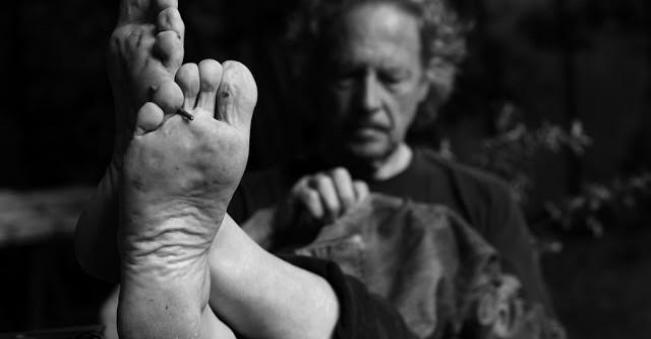
Donata Wenders, Peter Handke, Chaville 2009
After receiving such prestigious awards as the Kafka prize in 2008, and the Ibsen prize in 2014, Handke’s return to the public eye inevitably stirred up the controversy. Perhaps it is easier to attack Handke for his views than to analyze and comprehend the full range of motivations the writer has given for his opinions. Admittedly, his unquestioning espousal of Milošević’s doctrines is hard to digest, in particular by today’s Serbian democrats.
There have been two relatively recent translations into Italian after Die morawische Nacht (2008; Italian: La notte della Morava, Garzanti 2012), with its close ties to Mein Jahr in der Niemandsbucht (1994), published in English by Farrah, Straus & Giroux as ‘My Year in the No-Man’s Bay’ (1998). These are Un anno parlato dalla notte (Moretti & Vitali 2013, originally entitled In einer dunklen Nacht ging ich aus meinem stillen Haus, Suhrkamp Verlag Gmbh 1997, published by Farrar, Straus & Giroux in 2000 as On a Dark Night I left My Silent House) and Saggio sul luogo tranquillo (Guanda 2014) from the 2012 original Versuch über den Stillen Ort (Suhrkamp Verlag). The latter marks a return to a genre Peter Handke excels in: the Essay. The ‘Quiet’ or ‘Still Place’ Handke alludes to in the title is the toilet, privy or outhouse provocatively analyzed as a private space rather than as a function, in the mold of the Japanese author Tanizaki in his essay entitled In Praise of Shadows where he discusses the esthetics of such places.
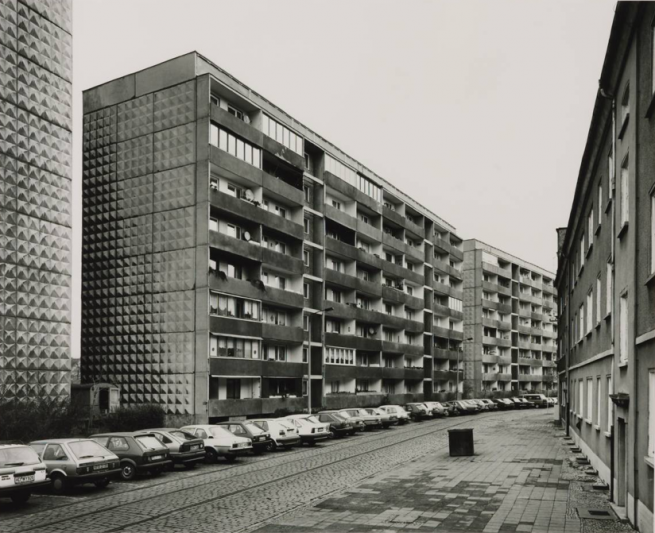
Thomas Struth, Ferdinand von Schill Strasse, Dessau 1991
These recent translations into Italian provide me with a springboard for examining similar essays by Handke. By doing so, I will attempt to analyze how the Austrian writer tackles the essay genre, which, as I said before, I feel has given him the tools to write some of his most successful work. Or rather, the work I am most interested in and appreciate the most. I do not feel the same transport for his novels, although there are many pages that are worth reading the whole book for. Handke himself, in a recent interview, said, “I think on the spot. That’s all. I’m not interested in narrating. My plots are disguised, or buried. I prefer to ‘realize’ a work of art in the sense Cézanne meant by the word.” In On a Dark Night I Left My Silent House dreams are not what they seem. They are not stories or even fragments of stories, but snatched phrases and isolated segments woven together in a highly original fashion with a rhythm that accentuates their evocative potential and intensity.
Which is a way of avoiding telling the story of the dreams. Precisely because his stories may seem worn out, seasoned even, Handke has always tried to avoid narrative traps by experimenting with different genres and techniques (notebooks, diaries, dreamscapes, theatrical works with little or no dramatic action, prose-poems and “poetic” verse with epic intentions, etc.). The form of the essay gives Handke the opportunity to tell stories, placing narrative in a prominent but not pre-eminent role. The very history and vocation of the essay form, after all, has always lent itself to this highly controlled experimental trend. And yet, the genre requires a structure as well as highly skilled language craftsmanship if it is to avoid the trap of “stinking of banality” or the “Language of drones in the age tin” Essay writers should never relinquish the responsibility of handing down and communicating their ties with tradition – whether they be in opposition to it or an alternative to it. After his early avant-garde provocations, in fact, Handke was keen to re-establish his ties with tradition. He did this by introducing innovations, which is the only way to keep tradition alive. Tradition is something you can always go back to, after short periods of absence or after years and years of estrangement, the burden of oblivion mingling with the knowledge and experience that has matured in the meantime.
Let us return, then, to dreams and storytelling. When dreams appear in Handke’s work, he never tells their story. He doesn’t even hint at the emotions they trigger. What he does is list actions, or segments of discourse, dialogues and thoughts, the briefest of utterances, free-floating remarks. He puts them all in a row, one after the other, with no links between them, other than the regularity of the space bar (The Jukebox and Other Essays on Storytelling, Farrar, Straus & Giroux 1994).
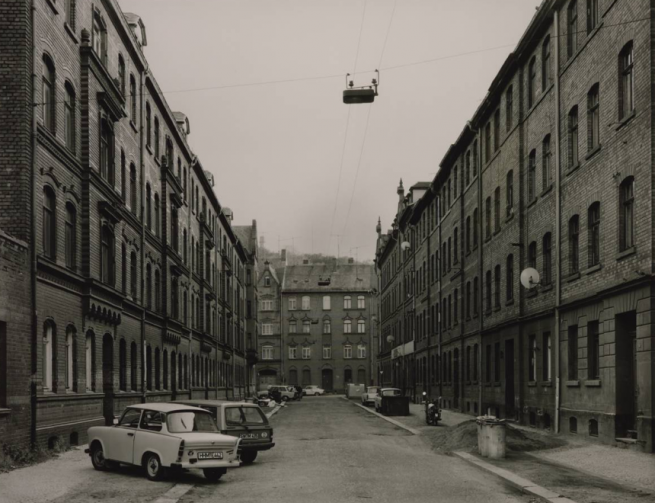
Thomas Struth, Hermannsgarten, Weissenfels 1991
In On a Dark Night I Left My Silent House, which is made up entirely of dreams, Handke similarly avoids recounting the dream. He lets the dreams themselves, or what remains of them, reveal themselves in words and thus speak for themselves. The issue of central connection, as Handke has stated in various interviews, is a non-issue for the writer. And yet, the way the book is constructed, with its regular cadences and patterns, ends up creating subtle connections. The very co-existence within the work of silences, peculiar single sequences, resemblances, echoes and internal dialogues implies and allows connections to be made.
Thus, the essay form that Handke has developed throughout his career, starting with what must be his incunabulum, the 1995 drama text Till Day Do You Part or A Question of Light (UCP-Seagull Books 2010) responds to the author’s desire to narrate without a plot, with no protagonists, without anything happening, and without any unfolding of events (with their concomitant transitions, ties, parallels, counter-positioning, inter-weaving or time and place). Or at least with minimal or functional elements, which are inserted, placed side by side, or simply follow one another in a sequence. Handke hardly ever resorts to exemplifications because they rely on ranking, which goes against the main principle of his writing. That is, in Handke’s view, every element should enjoy the same fullness of being in its rightful place, neither before nor after, neither under nor over another element.
An essay, as the meaning of the word suggests – even in the German term Versuch – is an attempt or a trial. It is experimental and adaptive by definition, and ‘formative’ in that it not only gives form to the object of the experiment, but its success also hangs on its form and its language. Even writers who grew up in the midst of modernity, in a postwar climate of avant-garde, cannot avoid storytelling. However, those who grew up in this period are distrustful of–if not explicitly opposed – to “stories”, “plots”, “characters” and any hint of “action”, especially if the narrative elements are clearly marked. Even without the author’s interviews and statements in this regard, Handke’s attitude can be seen at work in his writing to this day.
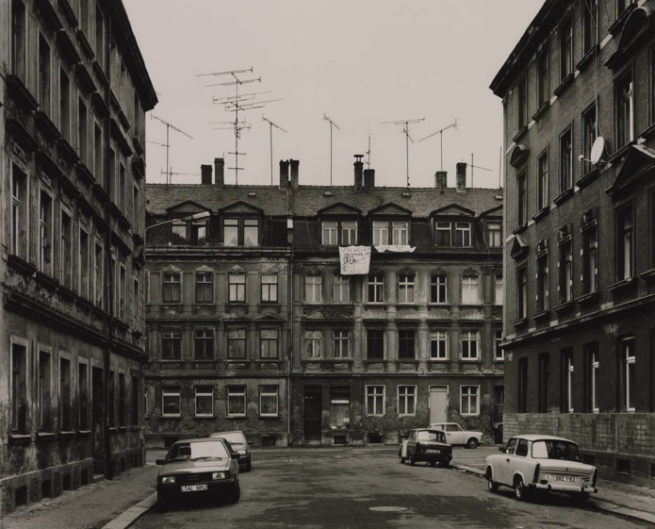
Thomas Struth, Salzmannstrasse, Leipzig 1991
Taking the lead from the postwar German literary association, Gruppe 47, Handke has no appreciation for writers who use language instrumentally or instinctively, subordinating it to a presumed representation of reality, which, in its turn, is considered to pre-exist or exist outside the writer. Handke believes, by contrast, that language should be considered or assumed to be a reality in itself – to be dealt with, grappled with, and combated, using engagement and a sense of responsibility. Language, in this view, is a barrier, a locus, a starting point, a threshold, because it is unoriginal and handed on, in the same way that plots are unoriginal and handed on. For this reason language is itself a locus of conflict. Thus, even Handke gives in to storytelling (and to the joy of succeeding in telling a story) against his better judgement. He may do this by finding alternative ways, different every time, but these ways will always be “necessary” or “binding” because the act of writing needs to find its own legitimacy and necessity if it is to start at all. As Handke states in his 1980 travelogue, Die Lehre der Sainte-Victoire (published by NYRB in Slow Homecoming, 2009): “What is the law of my object – its obvious, binding form?” and “the right to write–always necessary, with every new work.”
Storytelling can thus take place through description, by means of a quest for a new epic of the ephemeral, focusing on the unimportant or trivial (not to be confused with the New Italian Epic), closer to Francis Ponge’s minimalism, which personally I prefer for its dry rendering of the everyday. More importantly in this context, however, storytelling can take place by means of an essay. The author identifies an object-theme-subject which activates his writing. It is triggered by an image, a feeling, an expression (such as “successful day” in his 1992 Versuch über den geglückten Tag) The activator or trigger could be something elusive or intense, but the main point is that it does not pre-exist the writing. It is born of the act of writing, and is shaped and developed as the writing proceeds. By telling its story, the subject is demarcated, outlined and explored more deeply.
A subject is required. An essay that puts something to the test does not need an abstract mind. The experiment is not conducted by a disincarnated rationality. It must perforce be filtered by the experience of the person performing it. Without this person and without this experience the experiment has no value. Just as a subject is required, so is its demise. In fact, only by overcoming itself and moving towards its object or towards others, letting itself be captured by the object while the object itself is captured, can the object be understood and communicated, on the basis of common ground. In the same way, circumstances and places, meetings and memories, hypotheses and fantasies become equally necessary. They follow the writer on his path, a path that has already been traced. Handke often talks about a writer’s preparation. First, the choice of location (e.g. the Spanish city Soria, birthplace of Antonio Machado, in his 1992 Versuch über die Jukebox published in English as ‘The Jukebox and Other Essays on Storytelling’, Farrar, Straus & Giroux, 1994, or Salzburg for the ‘Successful Day’). Then, method and period (the end of the year in at least two cases: the end of 1989 in the Jukebox, with the aim of detracting from the pomposity of those who glorified the historical reach of the event). Finally, the ritual of the preliminaries and the subsequent transformation into writing, the material conditions and the organization of the author’s days while he is undergoing the writing. This is where the storytelling takes place.
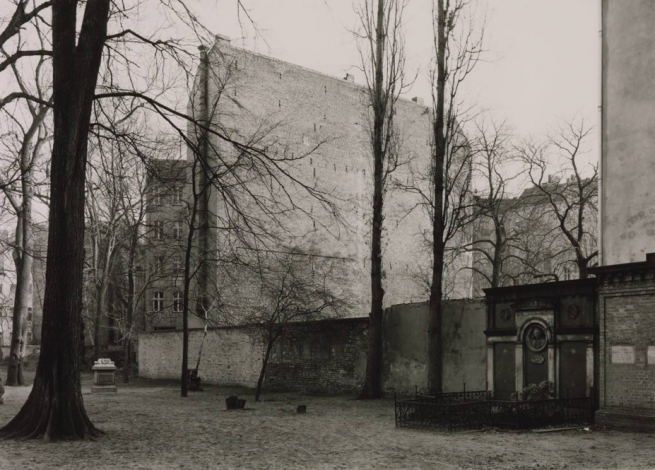
Thomas Struth, Graves at the Sophienkirche, Grosse Hamburger Strasse, Berlin 1992
The narration has no aim and is not an end in itself, and it does not adapt itself to a pre-existing skeleton structure. The story thus springs up and grows in any number of ways, and neither closes itself off nor encloses everything in itself. There is no end. Because the essay springs from an experience which is still underway, the very act of focusing on the way the experience unfolds and imposes itself on the writing is a form of narration. Storytelling is therefore a necessity, free of the arbitration of extrinsic decision-making and free of the straight jacket of pre-constructed grids ready for use as if they were neutral containers or welcome banners. For every experience explored and analyzed in the essay, the storytelling is obliged to find an appropriate form and language.
Generally speaking, Handke’s novels, in particular the more recent ones, are a tour de force of non- storytelling. That is, they postpone the issue indefinitely, struggling to express the tale without using facts, or significant events. Everything is stripped down to the bone, hinted at, or broken down into tiny pieces and re-presented as an enumeration of gestures, postures, or distinct actions. That is not to say, of course, that the enumeration is not in itself a construction. Expressing anything is a choice, selecting one action from a continuum means assigning a meaning to it, however minimal, for a writer whose ideal rule is a completely flat zero.
Handke works around the facts or events, describing every detail down to the finest implications, how they came about, how they were directly or indirectly derived, at times without even naming them. It is not that the author does not define them. It is not that he adopts a non-representational writing style, oscillating between over-abstraction and unsustainable tension, which would require a close reading of the composition of a phrase and would make it very difficult to re-construct a unified thought process. Rather, the writer comes up so close, is so immersed in the space and time of the facts and events underway, all the component parts, and the whole inner structure is described in such maniacal detail, that it is quite hard in the end to get a concrete idea of what is actually happening (Slow Homecoming, On a Dark Night).
Things and places are eclipsed. There is an outline, a silhouette drawn by tracing around the edges, inside and outside the margins, making the subject hard to recognize. The continuity of the outline vanishes as a result (or as a cause) of some unnamed factor that turns out to be decisive. Like a flash, it comes and goes, annulling everything that has been said in the place of the forbidden naming or defining. Or in the place of an impossible mimetic representation (impossible, most of all, for the writer, who is incapable – both unable and unwilling – but who knows that only by disappearing as the author can he start writing and give birth to the story). Handke confessed, when writing ‘Slow Homecoming’, that his aim was to write in a language that was “dematerialized but concrete” (Till Day Do You Part). He sharpened his technique in later works, requiring extra effort on the part of readers, in the sense that the language is hard work. And yet, the absence of hard work is simply blandishment, or the safety of well-known territory: readers need to make some effort too. In other cases, however, Handke has produced some inimitable contemporary prose.
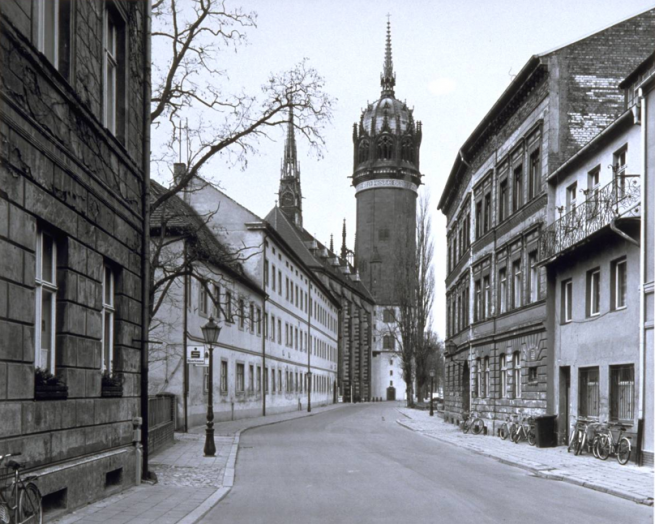
Thomas Struth, Schlosstrasse, Wittenberg 1991
In the essays, the storytelling is more relaxed. This is especially true in Handke’s most recent essay, linked perhaps to the fact that memory is at work with greater constancy and less resistance–stylistic and formal, but also subjective, existential, and according to principle. Or perhaps to the use of the past tense, evoking something that has never been said and that, finally, at the age of 70, can be said. Even though there is nothing shameful to confess, no deeply hidden denials. It could be said, paradoxically, that while some authors write essays on the side, as an alternative to novels or short stories, or with fiction as their subject, Handke writes essays in order to tell a story. It is hard to blame Handke for the relief he must have felt as he wrote about his mother’s suicide in such a direct and soft-pedaled way. Throughout his working life he has never done anything different; he has always found indirect ways and different figures (see, in particular, A Sorrow Beyond Dreams, Farrar, Straus & Giroux 2012).
It is as if, in his essay devoted to the Quiet Place, even more than in his other essays, and despite his statements to the contrary, Handke has abandoned, or at least muted, his epic ambitions. It is as if the epic of insignificance becomes significant only in the instant it emerges of its own accord, out of the undefined real place, or out of the mind, and calls for our attention. Our attention is grabbed for a moment, or forever. It is captured for a period (an interval or a duration of time) that can be extended in length, or in breadth, and reaches out towards people, places, or things, towards the world, towards life and towards the subject itself. It is like thirst, or like a vacuum, that will take a long time to fill. There is nothing emphatic, and the tension in the writing is similarly reduced. Both the tension that is the result of over-control, which aims to avoid clichés or stylistic banality, and the tension caused by the intensity of feeling and of writing, which aims to reign the tension in and make it last as long as possible, even push it to its highest point of incandescence and hold it there (like certain tantric or Chinese erotic literature, here more ecstatic than agonizing). It is as if Handke is no longer scared of peace. Not the kind he says he has sought out all his life – and at times even found – but the peace that comes from letting himself tell a story. A story which is not experienced a priori as a mechanism that by its own nature empties and flattens the telling, but which he sees as a distinct possibility, pregnant with thought and experience.
There are many elements in this work. Place, a slow pace, narrative description, “epic” minutiae (in tone and development), and the absence or minimal presence of plot, which is seen as a ‘construct’ to be broken down or dislocated. In addition, the accidental irruption of action (of the story) into a discourse that does not foresee any action (seen as an unexpected result of the act of writing rather than as a prescribed track), the ego as a structural but unsentimental factor, an inseparable subject, immersed in, and brought to life by, perception and emotion. And there is more. The autobiographical self, where the “auto” is especially important, self-determining and never prone to narcissism (in principle, though even as meticulous a writer as Handke does not always succeed). Even in a memory, the cult of the self is present, just as it can be found in pleasing anecdotes that re-discover and save, or seek personal or historical salvation, consolation or other forms of palliative action. Memory and autobiography are always close to the ground (like a flight, or a throw that is close to the ground). They are close to the moment of writing, and take place neither before nor after.
One of the most interesting and original aspects of Handke’s essays is that their subject is never cultural, in a traditional sense of the word. That is, his essays are not on books, painting or music. Their subject is either very precise (a juke-box, a quiet place) a vague notion, or an expression (“a successful day”) or even a word (“tiredness”). These subjects are given life and defined by the activity that revolves around them and courts their attention, slowly demarcating their outlines and then zooming in and focusing. An image, a thing, a feeling, all become the object of an inquiry, of a thought-process that does not lose sight of the absence, the vagueness, the pure potential that triggered it and in which it is grafted. Agamben, in his Il fuoco e il racconto (Nottetempo 2014, p. 111) wrote that thinking “means remembering the blank page while you are writing or reading. Thinking – and reading – means remembering the subject.” The subject of the world, of the body, and for writers above all the subject of writing: language.
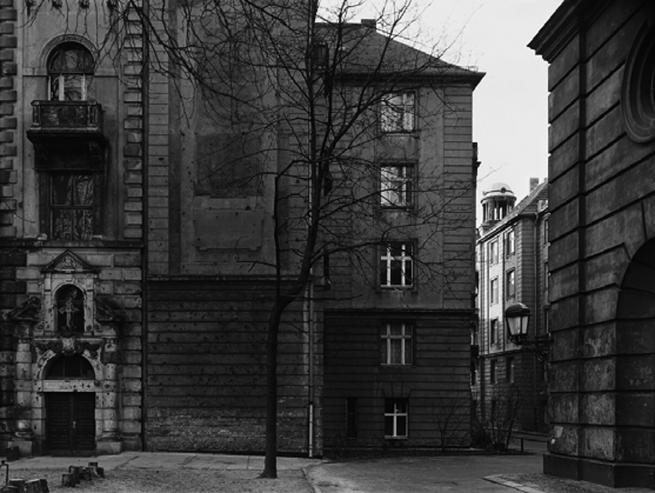
Thomas Struth, Sophiengemeinde 1, Grosse Hamburgerstrasse, Berlin, 1992
In Handke’s essay on the Quiet Place, for example, the calm place is the privy, to which one can withdraw and be alone with one’s body and its intimate functions. Privies have always been regulated and separated off by society, but at the same time they are the place where emotions can be experienced, opening themselves up to words which give expression to whoever is locked in there. It is the most private of private places, and, as we all know, you do not have to do what the function of the place expects you to do. Safety, separation, getting in from the outside, is what counts. You go there to do what you want, or what you allow yourself to do, and your desires call out to you from within rather than imposing themselves on you. The privy is a refuge, and at the same time a place where you settle, where you take possession of the place that was hostile or alien to you a minute before. Handke illustrates his point when he describes his arrival in the seminary school, or the toilet in the Nara Temple: “Only that morning, when I went into the toilet at the Nara Temple, did Japan become familiar to me. That was when I landed on the island, it was then that I took possession of the whole country.”
Handke is always conducting research on his subject. You can see this when he cites toilets in other works. Already in Till Day Do You Part when he talks about Cézanne’s multiple views of Estaque, or the pile of wood in his childhood: “After a while I could choose, or so it seemed, to be “the invisible man” whenever I pleased”. Handke retires to the safe refuge of the privy in order to overcome the impediment, by his own admission almost autistic, that so often takes over when he meets other people. He is “mute, painfully excluded from the goings on” (the first of four ways in which his ego, as a subject of language, relates to the world, Versuch über die Müdigkeit, Suhrkamp Verlag 1989). In the toilet, the author can return to language. The place of separation is a threshold, opening a door to a return of language. Likewise, the image of emotion leads to words, to writing, to a space opened up by writing and writing opened up by space.
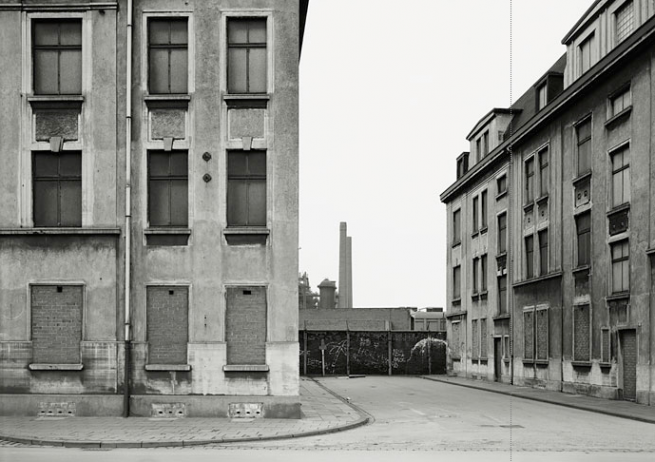
Thomas Struth, Werthauser Straße, Duisburg 1985
The meticulous care Handke takes with his writing is the same as the attention he pays to the tiniest details of every object, person, sensation and emotion. His single-minded focus on every nuance can only be achieved by never neglecting any detail, however insignificant. This level of attention is not voluntary. It is not an act of domination aiming to reign in sensitivity and assimilate it as part of our chemistry. It is, rather, a sign of availability, a welcoming spirit, an exercise in reducing the ego. The eclipse is not sought after or desired. It is rather self-installed (like a benign computer virus) in order to embrace every detail, and make every feature stand out and ring true in its uniqueness, as what it is and why it is. At the same time, the writer aims to give tone, definition, and intensity to whoever uses the eclipse. And is overtaken or pervaded by it.
Often a phrase does not delineate the space of the description (of a thing, person, or feeling). It traces a path of approach, describes the process of focusing the lens, leads the reader inside the workings of the writer’s perception and thought while he is observing and writing. This process, this approximation, which becomes a story or an adventure, is not dictated so much by fidelity or obedience to things or to perceptions, as to language, mechanisms, rhythmic and semantic sounds which beat the drum from one word to another. They build bridges or disjunctions, relationships or affinities in differences and oppositions, forge even stronger links, not for poetic license or exhibitions of rhetorical or formal flights, but because it is only by listening to the pulsation of the beat that the beat can manifest itself in things.
It is always hard to say what Handke writes about. As soon as you try and define his subject matter, topics or themes lose their substance, become less concrete, dissolve. If you try and name them, all that remains is the name, and all the name does is evoke something trivial and banal–nature, space, time, myths–in disproportion to their importance in the story or their fullness of meaning. If you take them out of context, extract them from the flow, from the delicate, almost invisible, but incredibly strong cogs and ties that makes the language work (but does not define it), if you take them away from the tension that holds them together soldering every part to the whole – if you do all or any of these, names and things, thoughts and emotions empty themselves out or deflate completely.
A writer who one loves is not a model, but a way. His proceeding is not a proposal for a social and existential path, for readers it is a realization and at the same time a tool, an enrichment not a rule. At best it is an invitation, an opportunity to experiment. A material and spiritual exercise. In this sense, the “romantic” aspects, or whether the author considers what he does part of an esthetic utopian path, are less important. But what that concerns only himself. What is important, then, is not what Handke “teaches” us directly, whether he has a doctrine or an idea to convey, but the fact that he is a practical example of visual and thought-processes, of the way language and syntax is used. The precision of his vocabulary, even when he is describing highly abstract concepts and the risk of imprecision is ever present, is a model.
In The Weight of the World (Farar, Straus & Giroux 1984; Collier Books 1990; Das Gewicht der Welt. Ein Journal, 1977) Handke wrote: “As a writer I always pretend to invent myths, finding others that have not, therefore, nothing to do with those in the West culture: as if I need new myths, innocents and taken from daily life, from which reconstruct myself (not Alexandrians references to myths like Joyce and Beckett)” [June 6th 1976] a need that in his Essays found more direct avenues of satisfaction.
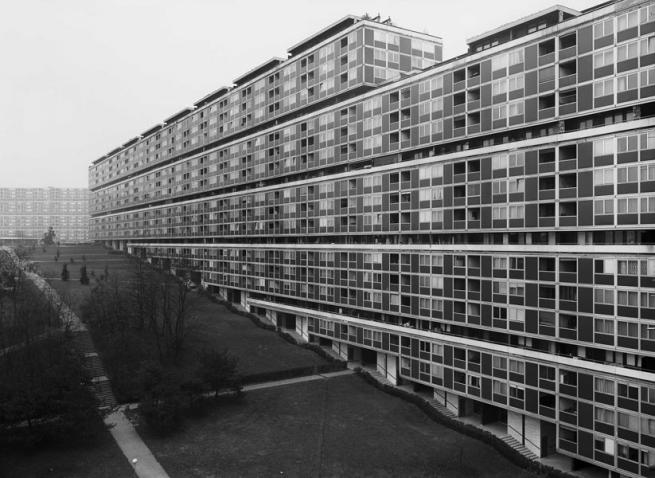
Thomas Struth; Le Lignon, Genf, 1989. Courtesy Privatsammlung / private collection
Again, “I am convinced of having to completely forget the past, not to succumb to this most chest pain: I have to lose my memory! Proust and against Benjamin and well protected bourgeois consciousness with his pleasure of memory and his consciousness of it (my fight against the memory, which limits me from childhood, threatening me with death!)” [March 28th 1976]. A struggle that manifests itself in his concentration on the present of his perception and his writing, but, in some of his essays, particularly The Jukebox, it loosens in his essay Quiet Place, Handke accepts he has lost, or has finally stopped supporting.
What Handke’s books hand on are not only ideas and emotions, but more importantly, a way of learning to live, and a way of living in order to learn to live. You can only live by trying at all times to learn to live, to move around things in the world, see them and manage them while respecting them for what they are and for how they are linked to everything else. Appreciating how things are connected to outer and inner space and time helps you become wiser. And thus happier. Or less unhappy. Or even just a little less unhappy, if possible.
Luigi Grazioli had published for doppiozero books, Figura di schiena, and Emmanuel Carrère
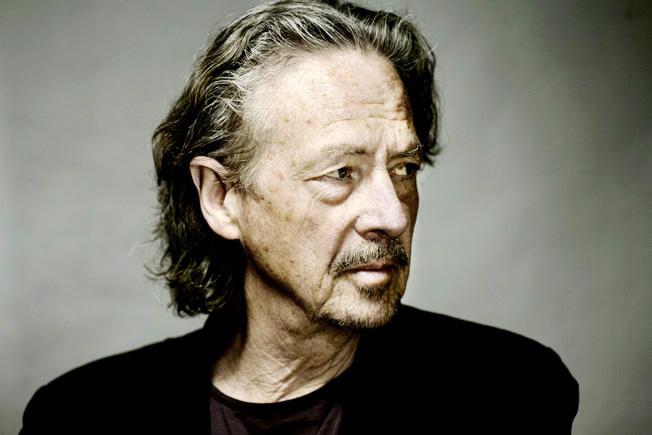










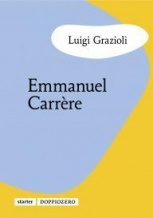
 Since 2011
Since 2011 

